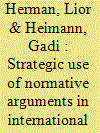| Srl | Item |
| 1 |
ID:
178678


|
|
|
|
|
| Summary/Abstract |
This article examines how and when energy is used as a punitive or rewarding measure to advance foreign policy ends under conditions of perpetual conflict. Drawing on hundreds of primary governmental and commercial documents, and extensive elite interviews, we examine Israeli–Palestinian relations over 50 years. We find extensive instrumentalization of energy for foreign policy objectives in the conflict. We highlight electricity, a neglected area in international relations and conflict literatures, as a significant foreign policy tool. Our findings emphasize four major variables that shape the timing and form of energy measures—politics, regime type, dependence level, and energy production chain.
|
|
|
|
|
|
|
|
|
|
|
|
|
|
|
|
| 2 |
ID:
178124


|
|
|
|
|
| Summary/Abstract |
This article claims that normative arguments play a greater role in negotiations than existing scholarship implies. While the approaches of communicative and rhetorical action limit the use of arguments to environments that meet certain conditions, in fact normative arguments are widely used and can be found in almost every example of negotiations. This article seeks to explain this phenomenon. Negotiating parties that feel obligated to tackle normative arguments raised by the opposing side – either because of the presence of an audience or to maintain its reputation – have a number of tools at their disposal. Negotiators who are unsuccessful in tackling these arguments will tend to offer a proposal that is more attractive to the other side. Although normative arguments do not generally have a sweeping influence on the outcome of negotiations, they are still likely to play a significant role. The article applies this theoretical framework to the case of the lengthy negotiations between the EEC and Israel, in which the former had no material motivation and desire to cede to Israel’s demands and nevertheless did so.
|
|
|
|
|
|
|
|
|
|
|
|
|
|
|
|